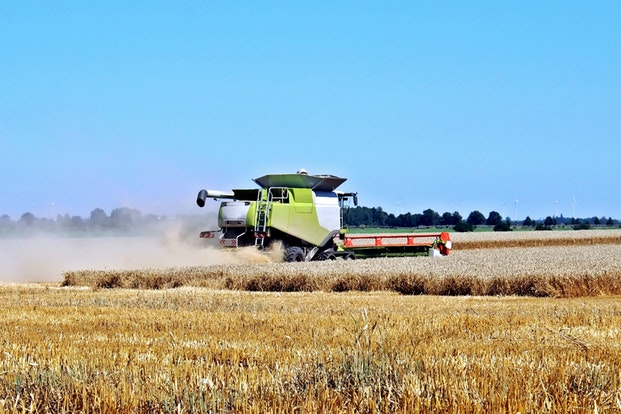The digital sharing economy: A cheaper way to mechanise

African markets might look to South Africa for additional maize supplies
March 23, 2018
Africa’s agricultural transformation to be feeded by data
March 29, 2018
The cost of farm machinery is a major challenge for small-scale and commercial farmers. Nick Hoffman, general manager at Linebooker, and Jehiel Oliver, creator of Hello Tractor, explain how new digital platforms are being used to source equipment with ease.
Digital technology, such as the Internet, social media, smartphones and GPS, is revolutionising how people connect and conduct business.
One of the most remarkable developments to emerge from this is crowdsourcing: acquiring a range of services from suppliers in the community and using the Internet to link these with customers. Uber, which has upended how taxi services work, comes to mind.
So does Airbnb, an alternative to booking traditional travel accommodation.
This trend has begun to emerge in the agricultural sector too. A year ago, South African cold storage company, CSS Logistics, launched Linebooker, an online bidding platform based in Cape Town that connects farmers to transport service operators. According to its general manager, Nick Hoffman, Linebooker removes the economic inefficiencies of transporting crops.
Changing the system forever
Due to the nature of harvesting, there is often enormous demand for transport at specific periods in specific regions, explains Hoffman.
In the citrus season, for example, farmers have only a four-month window to get limes and tangerines to market; this creates truck shortages during overlapping peak seasons among different crops.
An additional problem is that transporting agricultural produce to cold storage is a one-way journey; return trips for the transporters are limited. Online bidding makes truck supply and demand more transparent, offering opportunities to fill trucks that would otherwise be empty.
Using the Linebooker platform is easy. Users, namely transport suppliers and those looking for transport, register to ensure they are credible and comply with minimum basic requirements.
“All the transporters are pre-approved and vetted for requirements, such as goods-in-transit insurance. Linebooker’s own transport controllers look after the administrative elements, such as pick-up, delivery documentation and invoicing,” Hoffman explains.
Once registered, a customer can log on to the Linebooker platform at linebooker.co.za via smartphone or computer, and specify the load, delivery points, temperature ranges for the goods, pallet numbers, and any special requirements, such as periodic temperature checks.
Transport companies then have two hours to bid, in R200 increments, on the load.
“The system is much more transparent than using a transport broker, who typically charges a brokerage fee to ‘marry’ a transporter and a customer,” says Hoffman.
The identity of the company that will supply the service is revealed after the customer has selected the winning bid. However, a customer is not obliged to use this company’s services.
A booking fee of between R100 and R450 is charged depending on the size of the load, but there are no additional costs for the service providers.
Customers have up to 30 days to pay for the service, while Linebooker remunerates the trucking company within 15 days of delivery. Hoffman estimates that customers save 13% to 20% on transportation costs when using the service.
While Linebooker makes it easier and cheaper to transport produce, Hoffman says that the idea is not to create competition with existing transport companies, but improve efficiencies in the industry by linking companies with more clients.
“We don’t have a problem with customers using winning trucking companies directly afterwards,” he adds.
The main challenge has been to persuade customers that they no longer need to have a fixed contract with a company to guarantee transport.
“We have over 133 transporting companies registered, with a virtual fleet of more than 4 500 vehicles, including refrigerated trailers, tautliners, flatbeds, tippers and pantech trailers. The chance of not securing a contract for a time-sensitive load is almost the same as if they had a fixed contract,” he claims.
Leasing machinery
Crowdsourcing is also challenging the notion of traditional equipment ownership.
US-born Jehiel Oliver has founded an African-based company, Hello Tractor (hellotractor.com), a digital platform that connects tractor owners with farmers.
His system, launched in 2013, is an updated version of the age-old concept of farmers sharing their implements. Grain runners (companies that share implements for harvesting and planting grain) have long operated throughout North America, especially on large farms; in Germany, so-called ‘machine rings’ (Maschinenringe) operate on the same principle.
Oliver, who has travelled extensively in sub-Saharan Africa and Asia to market the technology, targeted Nigeria initially.
“It boasts one of the largest volumes of uncultivated land in the world, and I realised that the majority of the poor people there depended on agriculture for their livelihoods. Hello Tractor has since expanded into Kenya, with pilots in Tanzania, South Africa and Senegal,” he says.
According to Oliver, lack of access to labour and technology prevents farmers in developing countries from realising their full potential, with urbanisation reducing the labour available in rural areas, and in turn driving up labour costs.
Farmers are also growing older, as the younger generation prefers easier ways to earn a living.
The lack of labour means that most Nigerian farmers plant up to 30 days later than they should.
“A farmer loses about 1,5% of his or her yield for every day that the crops are planted late,” Oliver explains. “Planting late, therefore, has a negative impact on farmer income, as well as on food security.”
In this scenario, the advantages of a tractor are obvious.
“It can perform the job of many people in a fraction of the time. It’s also less expensive. Labour in Nigeria costs about US$200/ ha [R2 900/ ha], in comparison with Hello Tractor’s rate of US$75/ ha [R1 100/ha]. And by allowing farmers to plant at the right time, tractors also improve production outcomes.”
Simplicity, speed and cost saving
Hello Tractor operates via ordinary cellphones rather than smartphones, which are unaffordable for most poor, small-scale farmers.
The farmer simply sends an SMS to his or her nearest booking agent, who then organises a tractor through a tractor company registered on the Hello Tractor database.
“The booking agents have an important task,” explains Oliver. “They need to cluster jobs in the same region to help save fuel and operational costs and, in effect, add value and remove inefficiencies from the system. It won’t work if a tractor has to drive 300km to plough half a hectare of land.”
Registered tractor owners receive a GPS device that is permanently fixed to the vehicle.
The device is linked with a computer platform that allows owners to assign operators to the tractors, view operations remotely, and keep track of the tractor and the market.
Hello Tractor uses a fixed device rather than a mobile one to prevent operator fraud, and in case the owner loses or misplaces the mobile one. The majority of the companies supplying tractor services are businesses, but farm owners can also share their machines. Hello Tractor can be used to hire other farming equipment.
Oliver has approached South African tractor distributors about introducing the platform locally.
“The initiative could make a tremendous contribution to rural development and improve the sustainability of emerging producers. It can also add value to well-established commercial farms, as in the US,” he says.
Oliver believes that ownership of farming equipment will shift towards companies that specialise in renting out machinery and operators.
It will no longer be necessary for producers to own machinery that is used for only a few months a year, is expensive to maintain, and which rapidly becomes obsolete.
He also predicts that tractor operators could become redundant within the next 10 years as cloud computing improves and allows for driverless tractors to operate in more regions.
Source: Farmers Weekly



